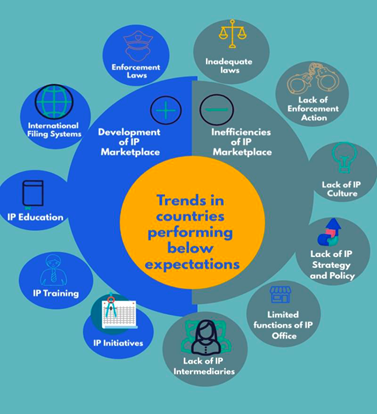A Strategy to Create a Robust IP Marketplace in Developing Countries – A Design Thinking Approach: New research project at MIPLM
The development of IPRs worldwide has led to the emergence of IP marketplaces. While these IP marketplaces are still in the embryotic stage in some regard, there are distinct differences in the efficiency of the IP marketplaces in the developed world vs the developing world. The impact of the 4th industrial revolution requires strategic alignment of IP laws and regulations, supported by an efficient and robust IP marketplace. However, where developing countries fail to improve the efficiency of their IP marketplace, the gap between the innovative developed world and the developing world performing below expected levels of development, may increase at an even faster rate.
As the IPR world skyrockets into the 4th industrial revolution, developing nations need to respond with vigour to run the innovation race or risk being left out of the race altogether. This research study was aimed at understanding the foundational institutional failures common in the IP marketplaces of developing countries and determining a strategy to resolve these institutional failures, using a design thinking approach.
This empirical study uses multiple cases for a qualitative comparative analysis using cross-case synthesis. The key components of the IP marketplace are used as a foundation to study the IP marketplaces of identified countries performing below their expected levels of development and common trends in countries performing below expectations are ascertained.

Figure 1: Common trends in countries performing below expectations.
Additionally, user journey maps are utilized to further illuminate the user experience of stakeholders in these IP marketplaces and identify key touchpoints that need to be targeted by policy makers.
For this research study, a detailed case study analysis is conducted on the IP marketplace of Singapore – a country chosen as being an achievable benchmark for the developing world. This case study is critically analysed and used to explore creative solutions for the development of a robust IP marketplace in developing countries.

Figure 2: Case Study on Singapore’s IP Marketplace
The case study on Singapore helps to illuminate the core elements of Singapore’s IP marketplace to be used to create a strategy, using design thinking, to develop a robust IP marketplace in developing countries so the true value potential of IPRs can be realized.

Figure 3: Core Elements of the Singapore IP Marketplace
This study shows that there are innate issues plaguing the IP marketplaces in developing countries. While each developing country has different factors and social elements that affect the efficiency of the IP marketplace, the institutional failures at the core of the IP marketplace remain constant. While efforts have been made to improve upon institutional failures in the developing world, these efforts have not resulted in the desired expected outcomes. The study shows that merely strengthening IPR laws and enforcement initiatives will not lead to a robust IP Marketplace.
The example of Singapore illustrates the effectiveness of a design thinking approach to policy changes and the impact that this can have upon the improvement in the level and quality of stakeholder participation in the IP marketplace. IPRs and development are intrinsically linked and thus the developing world needs to adopt a new strategy towards improvement of its IP marketplace to ensure sustainable growth and development.
This research project is conducted by MIPLM graduate Terita Kalloo and supervised by Prof. Dr. Alexander Wurzer and Dr. Thibaud Lelong both CEIPI.
 Terita Kalloo is an Attorney at Law in Trinidad and Tobago, specializing in the field of Intellectual Property and Entertainment Law. Terita studied Law at the University of the West Indies where she obtained a Bachelor of Laws. Terita also attended the Hugh Wooding Law School where she obtained her Legal Education Certificate and the Center for International Intellectual Property Studies (CEIPI) where she obtained a Masters in Intellectual Property Law and Management. She has a decade of experience as an Attorney at Law.
Terita Kalloo is an Attorney at Law in Trinidad and Tobago, specializing in the field of Intellectual Property and Entertainment Law. Terita studied Law at the University of the West Indies where she obtained a Bachelor of Laws. Terita also attended the Hugh Wooding Law School where she obtained her Legal Education Certificate and the Center for International Intellectual Property Studies (CEIPI) where she obtained a Masters in Intellectual Property Law and Management. She has a decade of experience as an Attorney at Law.
Terita currently heads a boutique intellectual property law practice, Terita Kalloo Law. She specializes in IP litigation, IP contracts and IP commercialization. In addition to her legal practice, Terita owns an IP Management Company, IP Harvester Ltd, which specializes in IP strategy and management and hosts an online IP marketplace for the Caribbean region. She is also a certified trainer at the National Intellectual Property Training Centre of Trinidad and Tobago.
Here is a description of the research project:



